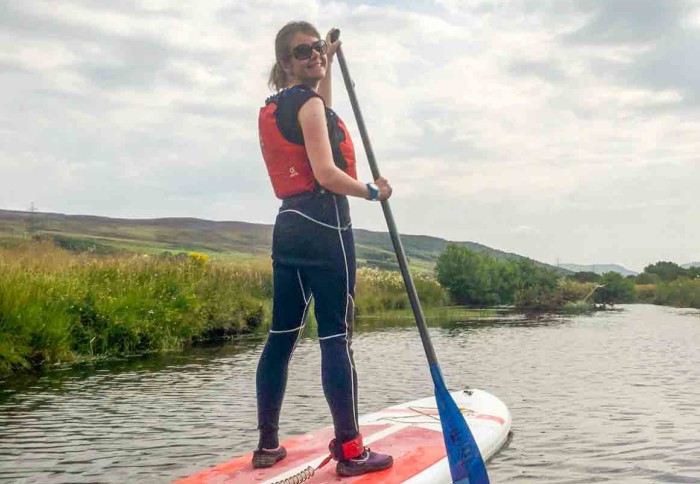Q&A: Understanding rainfall in Africa, talking climate impacts & paddleboarding

Quickfire questions with Dr Caroline Wainwright, who has joined the Grantham Institute as a Research Fellow in Climate Change and Risk over Africa.
Dr Wainwright specialises in climate change-related risk for populations whose livelihoods are strongly dependent on seasonal rainfall.
It was a trip to Uganda as an undergraduate that led her to study seasonal rainfall and what factors influence it. She went on to develop a methodology for quantifying seasonal rainfall across Africa – a tool that enables researchers to identify the beginning and end of rainy seasons across the tropics, study how the seasonality has changed over time, and identify long-term trends.
In her subsequent post-doctoral position, she used this methodology to explore recent changes in seasonal rainfall totals over Eastern Africa. At the Grantham Institute, she will continue to conduct research around seasonal rainfall and climate change risk over Africa.
We caught up with Dr Wainwright to find out more.
How did you get into your particular field of research?
Reliable rainfall is so fundamental to people’s livelihoods in Africa. Seeing first-hand how communities depend on it was one of my motivations for trying to understand seasonal rainfall, and how it may change in future climates. Dr Caroline Wainwright
During my time at university, I volunteered in Uganda with communities living in mountainous regions. Every morning, locals had to go to the spring at the bottom of the mountain to get water, so we built a water tank in the village. Having direct access to water in the tank had a big impact on the community – it meant locals didn’t have to make the two-hour round trip to the spring every day and children could be on time to school! However, water tanks only work if you have enough rainfall to fill them up.
Reliable rainfall is so fundamental to people’s livelihoods in Africa. It is essential for growing crops and refilling reservoirs, and has an impact on health as it influences the prevalence of mosquitoes that transmit diseases. Seeing first-hand how communities depend on water was one of my motivations for trying to understand seasonal rainfall, what factors lead to variability in the timing and amount of seasonal rainfall, and how we might expect it to change in future climates.
How does your research impact local communities?
For locals, knowing when to expect the rainy season is hugely important. It helps them make sure they have the right resources in place in terms of when to hire equipment, when to plough the land, when to plant and when to harvest. Understanding how the seasonal cycle may change in the future enables communities to adapt to changing climates, and helps them to be more climate-resilient. In Africa, I work with national representatives from universities and meteorological services, who in turn, work with community leaders to disseminate our research findings.
What drew you to the Grantham Institute?
The Grantham Institute isn’t just about excellent research. There is a strong focus on communication and policy. I’m looking forward to working with everyone here to make research relevant and accessible to decision-makers.
What do you think is the most effective way to talk to people about climate change?
 Climate change is now at the forefront of public consciousness, so I’m no longer having to convince people it’s a problem. Instead, I talk about what people can do about it and share things I’ve learnt from working in climate science.
Climate change is now at the forefront of public consciousness, so I’m no longer having to convince people it’s a problem. Instead, I talk about what people can do about it and share things I’ve learnt from working in climate science.
I find people often hear about melting glaciers and bigger storms through the media, but climate impacts in developing countries often get less coverage. When I talk about how rising sea levels and the salinisation of soils in Bangladesh is impacting vulnerable communities and devastating agriculture, people are shocked it hasn’t made the headlines in Europe and the United States.
What is the single most important thing ordinary people can do to benefit the environment right now?
I’m very humbled when I speak to people and hear how much they are doing to tackle climate change – there has been a real shift in terms of individual climate action. Personally, I have just insulated my house from top to bottom. I also cycle and eat a mostly vegetarian diet.
However, while personal actions are really important, you also have a lot of indirect power in terms of what businesses you purchase from, what services you use and who you bank with. Holding business to account is an important way for individuals to have an impact.
What would be your Desert Island Disc of choice?
It would have to be something from the Piano Guys or Einaudi - something calming and without words, so I don’t get bored of it. I would also take my knitting. I love having something practical to keep me entertained. I’ve been working on a jumper for about two years so might actually finish it on a desert island!
What do you do to relax and take you away from your work?
I get outside. Last year, I got my own paddleboard. It’s easy and accessible, and I’ve loved exploring rivers around Berkshire and the sea off the coast of Wales. It totally takes you away from work and gives you a different view of coastlines and countryside.
Article supporters
Article text (excluding photos or graphics) © Imperial College London.
Photos and graphics subject to third party copyright used with permission or © Imperial College London.
Reporter
Lottie Butler
The Grantham Institute for Climate Change